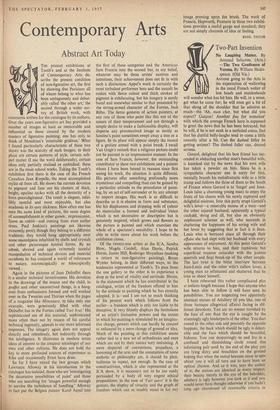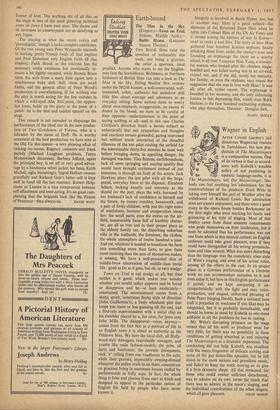Two-Part Invention
No Laughing Matter. By Armand Salacrou. (Arts.) —The Two Gentlemen of Verona. By William Shake- speare. (Old Vic.) ANYONE going to the Arts in the expectation of wallowing in the usual French welter of lost heads and maidenheads will wonder what has hit him. He will, in a sense, get what he came for; he will even get a bit of that shrug of the shoulder that he admires so much—the `Ah, mon cher, but what did you expect? Garcon! Another fine for monsieur' with which the average French hero is supposed to greet the news that he has been betrayed; but he will, if he is not sunk in a surfeited coma, find that his dutiful belly-laughs tend to come a little uneasily after a bit. Can the dashed feller be getting serious? The dashed feller can, deuced serious.
Gerard, delighted that his best friend has suc- ceeded in abducting another man's beautiful wife, is knocked out by the news that his own wife has taken a powder on him. Since he is a sympathetic character one is sorry for him, mentally brands his melodramatic wife as a little tramp and follows the three of them to the South of France where Gerard is to 'forget' and Jean- Louis (also a charming young man) to enjoy the fruits of his charm with his newly captured and delightful mistress. Into this party erupt Gerard's wife's lover—a miserable mouse of a man—and the other injured husband, apparently a typical cuckold, shrug and all, but also an obviously unpleasant schemer as well, who succeeds in ' shattering the happiness of his erring wife and her lover by suggesting that in fact it is Jean- Louis who is betrayed since all through their affaire she had slept with her husband with every appearance of enjoyment. At this point Gerard's wife returns to him, and their raptUrous but superficial reunion coincides with the jealous quarrels and final break-up of the other couple. The last twist is the bitter interview between Jean-Louis and the other wife's callow lover, a young man so infatuated and shattered that he tries to shoot himself.
I have rehearsed this rather complicated plot at tedious length because I hope that anyone who has been able to follow it will have seen its possibilities. You are inspecting two apparently identical statues of Adultery (if you like, one of those baroque allegorical affairs) facing in dif- ferent directions. You are no sooner ravished by the face of one than the eye is caught by the stunningly ugly hinderparts of the other. You dart round to the other side and precisely the opposite happens, the back which should be ugly is delect- able and the face which should be beautiful, hideous. You run despairingly to and fro in a confused and diminishing circle round this infuriating pair until by the end of the play you are lying dizzy and breathless on the ground hoping that when the moral heavens cease to spin about you it will all turn out to have been an optical illusion. And so it was, says the author of it; the statues are identical in every respect, their beauty merely in the eye of the beholder; i adultery is ugly however you look at it and you would never have thought otherwise if you hadn't long ago abandoned all reasonable criteria in favour of love. The working out of all this on the stage is one of the most glittering technical tours de force I have ever seen. The theme and its inversion in counterpoint are as satisfying as any fugue.
The playing is what the music critics call `prestidigital,' though it lacks complete conviction. Of the two young men Peter Wyngarde succeeds in looking pretty French (with all that implies) and Paul Daneman very English (with all that implies). Faith Brook as the mistress has the necessary svelte sweetness but emotionally re- mains a bit tightly corseted, while Brenda Bruce turns the wife from a nasty little egoist into a mischievous baby doll. Still, these are small faults, and the general effect of Peter Wood's production is overwhelming. If for nothing else the play is worth seeing for the few minutes in which a wild-eyed Alec McCowen, the appren- tice lover, holds up the party at the point of a pistol—he is the best and saddest spaniel on the stage.
This remark is not intended to disparage the performance of the chief star in the new produc- tion of Two Gentlemen of Verona, who is a labrador by the name of Duff. He is worthy ornament of the best production we have seen at the Old Vic this season—a very pleasing affair of twining ivy-leaves, Regency costumes and frank parody (Michael Langham produces, Tanya Moiseiwitsch decorates). Barbara Jefford, again the principal boy, is set off to very good advan- tage by a handsome velvet jacket, her beau, Keith Michell, sighs becomingly, Ingrid Haffner swoons gracefully and Richard Gale's better self is kept well in hand till the last moment. Robert Help- mann as Launce is a nice compromise between self-effacement and over-acting. It's no good com- plaining that the brigands look like the Pirates of Penzance—they always do. DAVID WATT



































 Previous page
Previous page